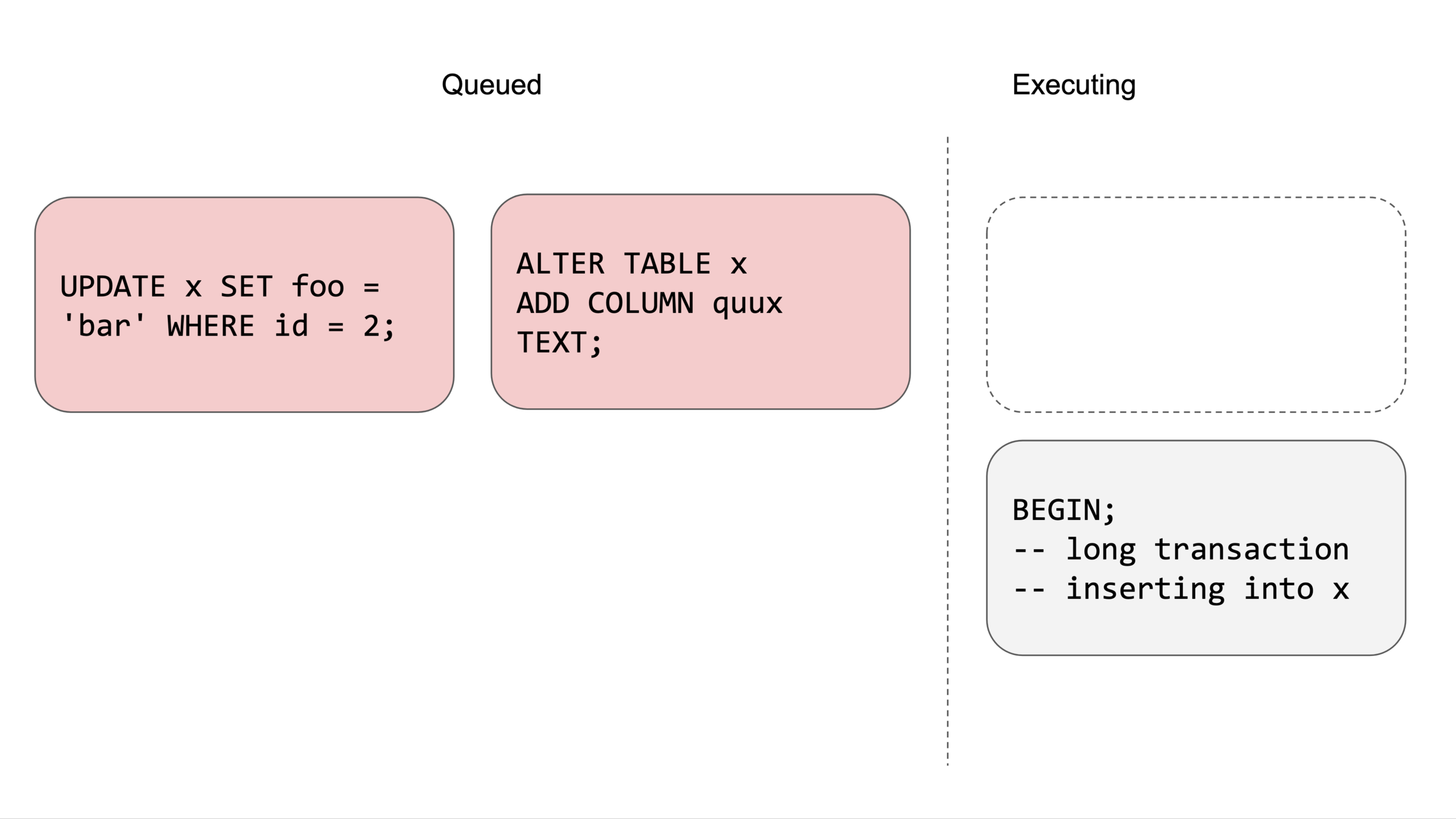PostgreSQL at Scale
Writing reliable migrations
#WhoAmI
Previously:
zil.kucinskas@gmail.com
Ruby on Rails migrations
class RemoveSomeColumnFromUsers < ActiveRecord::Migration[6.0]
def change
remove_column :users, :some_column
end
endDeveloper writes a file:
rails db:migrateRun (for example at deployment time):
ALTER TABLE "users" DROP COLUMN "some_column";Rails will generate and execute the following DDL:
Postgres main job is to keep your data consistent

Schema changes are challenging. It's like changing a car tire while it barrels down the motorway.
Consistency problems
Case #1 - column is added in the middle of a SELECT statement's execution
Expectation - we don’t want some rows in the result set to have the new column and others not.
Case #2 - column is dropped between the issuance of an UPDATE that writes to it and the actual execution of that UPDATE
Expectation - we certainly don’t want to write that obsolete value to some undefined location in memory or on disk!
Solution: PostgreSQL locking
Generally in Postgres, we have 3 main mechanisms of locking:
* Table-level locks
* Row-level locks
* Advisory locks
For most DDL changes, an ACCESS EXCLUSIVE lock will be required, a very strict lock that prevents all reads and all writes for the duration of the query.
Locking problems

Queries blocked for a long time by slow transaction and migration
When developers learn about locks?Common Case #1 - Deadlocks

When developers learn about locks?Common Case #2 - Migration
When I realize that my simple migration caused a major production outage
Reliable Migrations
Pitfalls and solutions
🚫 Removing a column
class RemoveSomeColumnFromUsers < ActiveRecord::Migration[6.0]
def change
remove_column :users, :some_column
end
endProblems in production
PGError: ERROR: column "some_column" does not exist✅ Removing a column
class User < ApplicationRecord
self.ignored_columns = ["some_column"]
endclass RemoveSomeColumnFromUsers < ActiveRecord::Migration[6.0]
def change
remove_column :users, :some_column
end
end1. Ignore from the cache
2. Deploy the code
3. Write a migration to remove the column
4. Deploy and run migration
Note: Don't forget to clean up the code
🚫 Adding a column with a default value
class AddSomeColumnToUsers < ActiveRecord::Migration[6.0]
def change
add_column :users, :some_column, :text, default: "default_value"
end
endProblems
* Adding a column with a default value to an existing table causes the entire table to be rewritten.
Note: This operation is safe in Postgres 11+
✅ Adding a column with a default value
class AddSomeColumnToUsers < ActiveRecord::Migration[6.0]
def up
add_column :users, :some_column, :text
change_column_default :users, :some_column, "default_value"
end
def down
remove_column :users, :some_column
end
end🚫 Backfilling data
class AddSomeColumnToUsers < ActiveRecord::Migration[6.0]
def change
add_column :users, :some_column, :text
User.update_all some_column: "default_value"
end
endProblems:
* Backfilling in the same transaction that alters a table locks the table for the duration of the backfill.
* Running a single query to update data can cause issues for large tables
✅ Backfilling data
class BackfillSomeColumn < ActiveRecord::Migration[6.0]
disable_ddl_transaction!
def up
User.unscoped.in_batches do |relation|
relation.update_all some_column: "default_value"
sleep(0.01) # throttle
end
end
endThree key elements of backfilling data safely:
* Batching
* Throttling
* Running outside of a transaction (Rails console, background jobs or disable_ddl_transaction!)
🚫 Renaming or changing the type of a column
class RenameOrChangeSomeColumn < ActiveRecord::Migration[6.0]
def change
# Example A. Renaming column
rename_column :users, :some_column, :new_name
# Example B. Changing column type
change_column :users, :some_column, :new_type
end
endCaveats - safe changes:
- Changing between varchar and text columns [9.1+]
- Increasing the precision of a decimal or numeric column [9.2+]
- Making a decimal or numeric column unconstrained [9.1+]
- Changing between timestamp and timestamptz columns when session time zone is UTC in Postgres 12+
✅ Renaming or changing the type of a column
- Create a new column
- Write to both columns
- Backfill data from the old column to the new column
- Move reads from the old column to the new column
- Stop writing to the old column
- Drop the old column
🚫 Renaming a table
class RenameUsersToCustomers < ActiveRecord::Migration[6.0]
def change
rename_table :users, :customers
end
end✅ Renaming a table
- Create a new table
- Write to both tables
- Backfill data from the old table to new table
- Move reads from the old table to the new table
- Stop writing to the old table
- Drop the old table
🚫 Creating a table with the force option
class CreateUsers < ActiveRecord::Migration[6.0]
def change
create_table :users, force: true do |t|
# ...
end
end
endProblems in production:
* The force option can drop an existing table.
✅ Creating a table with the force option
class CreateUsers < ActiveRecord::Migration[6.0]
def change
create_table :users do |t|
# ...
end
end
end🚫 Using change_column_null with a default value
class ChangeSomeColumnNull < ActiveRecord::Migration[6.0]
def change
change_column_null :users, :some_column, false, "default_value"
end
endProblems in production:
* This generates a single UPDATE statement to set the default value.
✅ Using change_column_null with a default value
class ChangeSomeColumnNull < ActiveRecord::Migration[6.0]
def change
change_column_null :users, :some_column, false
end
end1. Backfill the column safely.
2. Execute migration:
Note: In Postgres, change_column_null is still not safe with this method.
🚫 Setting NOT NULL on an existing column
class SetSomeColumnNotNull < ActiveRecord::Migration[6.0]
def change
change_column_null :users, :some_column, false
end
endProblems in production:
In Postgres, setting NOT NULL on an existing column requires an AccessExclusiveLock, which is expensive on large tables.
✅ Setting NOT NULL on an existing column
class SetSomeColumnNotNull < ActiveRecord::Migration[6.0]
def change
execute 'ALTER TABLE "users" ADD CONSTRAINT "users_some_column_null"'\
'CHECK ("some_column" IS NOT NULL) NOT VALID'
end
endclass ValidateSomeColumnNotNull < ActiveRecord::Migration[6.0]
def change
execute 'ALTER TABLE "users" VALIDATE CONSTRAINT "users_some_column_null"'
end
endNote: This is not 100% the same as NOT NULL column constraint. Here’s a good explanation.
1. Add a constraint
2. Validate it in a separate transaction
🚫 Adding an index
class AddSomeIndexToUsers < ActiveRecord::Migration[6.0]
def change
add_index :users, :some_column
end
endProblems in production
* In Postgres, adding an index non-concurrently locks the table.
✅ Adding an index
class AddSomeIndexToUsers < ActiveRecord::Migration[6.0]
disable_ddl_transaction!
def change
add_index :users, :some_column, algorithm: :concurrently
end
endAdd indexes concurrently:
* If you forget disable_ddl_transaction!, the migration will fail.
* Also, note that indexes on new tables (those created in the same migration) don’t require this.
🚫 Removing an index
class RemoveSomeIndexFromUsers < ActiveRecord::Migration[6.0]
def change
remove_index :users, :some_column
end
endProblems in production
* In Postgres, removing an index non-concurrently locks the table for a brief period.
✅ Removing an index
class AddSomeIndexToUsers < ActiveRecord::Migration[6.0]
disable_ddl_transaction!
def change
remove_index :users, :some_column, algorithm: :concurrently
end
endRemove indexes concurrently:
🚫 Adding a reference
class AddReferenceToUsers < ActiveRecord::Migration[6.0]
def change
add_reference :users, :city
end
endProblems in production
* Rails adds an index non-concurrently to references by default, which is problematic for Postgres.
✅ Adding a reference
class AddReferenceToUsers < ActiveRecord::Migration[6.0]
disable_ddl_transaction!
def change
add_reference :users, :city, index: { algorithm: :concurrently }
end
endMake sure the index is added concurrently.
🚫 Adding a foreign key
class AddForeignKeyOnUsers < ActiveRecord::Migration[6.0]
def change
# Case A.
add_foreign_key :users, :orders
# Case B.
add_reference :users, :order, foreign_key: true
end
endProblems in production
* In Postgres, new foreign keys are validated by default, which acquires a ShareRowExclusiveLock that can be expensive on large tables.
✅ Adding a foreign key
class AddForeignKeyOnUsers < ActiveRecord::Migration[6.0]
def change
add_foreign_key :users, :orders, validate: false
end
endInstead, validate it in a separate migration with a more agreeable RowShareLock. This approach is documented by Postgres to have “the least impact on other work.”
class ValidateForeignKeyOnUsers < ActiveRecord::Migration[6.0]
def change
validate_foreign_key :users, :orders
end
endThen validate it in a separate migration.
🚫 Adding a json column
class AddPropertiesToUsers < ActiveRecord::Migration[6.0]
def change
add_column :users, :properties, :json
end
endProblems in production
* In Postgres, there’s no equality operator for the json column type, which can cause errors for existing SELECT DISTINCT queries.
✅ Adding a json column
class AddPropertiesToUsers < ActiveRecord::Migration[6.0]
def change
add_column :users, :properties, :jsonb
end
endUse jsonb instead:
Closing remarks
Timeouts
ALTER ROLE myuser SET statement_timeout = '1h';
ALTER ROLE myuser SET lock_timeout = '10s';A good practice is to set:
* long statement timeout
* short lock timeout
Impact:
* migrations can run for a while, and if a migration can’t acquire a lock in a timely manner, other statements won’t be stuck behind it.
Recap
| Operation | Safety | Exceptions / Solutions |
|---|---|---|
| Creating tables | ✅ Safe | |
| Removing tables | ✅ Safe | |
| Adding columns | ⚠️ Warning |
✅ No constraints on the column ⚠️ Prefer jsonb over json |
| Removing columns | ⚠️ Warning | ✅ When telling AR to ignore column first |
| Renaming columns or renaming tables | 🚫 Unsafe | ✅ Add new column/table, write to both, remove the old one |
Recap
| Operation | Safety | Exceptions / Solutions |
|---|---|---|
| Creating indexes | ⚠️ Warning | ✅ Create concurrently |
| Removing indexes | ⚠️ Warning | ✅ Create concurrently |
| Renaming index | 🚫 Unsafe | ⚠️ Postgres 12 lowers barrier |
| Adding a reference | ⚠️ Warning | ✅ Create concurrently |
| Removing reference | ✅ Safe | |
| Adding a foreign key | ⚠️ Warning | ✅ Add foreign key without validation and validate in a separate migration |
| Removing a foreign key | ✅ Safe |
Useful gems
* strong_migrations (ankane from Instacart) - Catch unsafe migrations in development
* nandi (GoCardless) - Fear free PostgreSQL migrations for Rails
* zero_downtime_migrations (LendingHome) - Zero downtime migrations with ActiveRecord 3+ and PostgreSQL
* pg_ha_migrations (Braintree) - Enforces DDL/migration safety in Ruby on Rails project with an emphasis on explicitly choosing trade-offs and avoiding unnecessary magic.
* safe-pg-migrations (Doctolib) - ActiveRecord migrations for Postgres made safe.
Useful resources
1. Gitlab - What requires no downtime?
2. Gitlab::Database::MigrationHelper code
3. Gitlab Migrations Style Guide
4. PostgreSQL at Scale: Database Schema Changes Without Downtime
5. Rollout - Rails Migrations with Zero Downtime
6. When Postgres blocks: 7 tips for dealing with locks
7. Safe Operations For High Volume PostgreSQL
Write reliable migrations
Learn from others' failures, use the right tools to make your life easier and don't take your database down
Thank you for your attention.
Any questions?


Scan me to get presentation link



